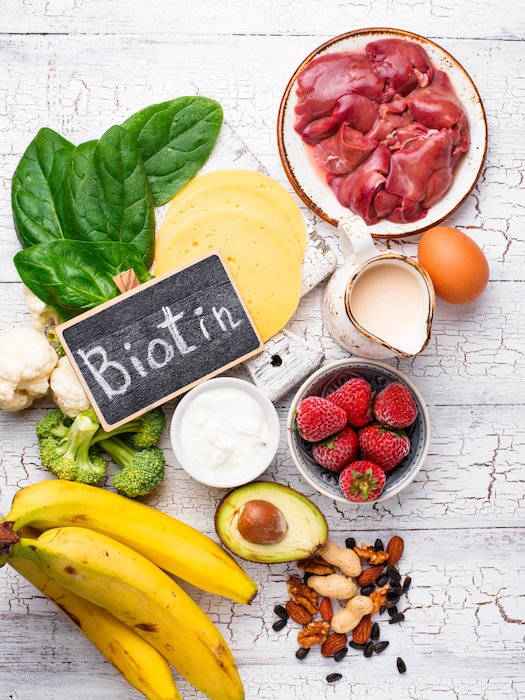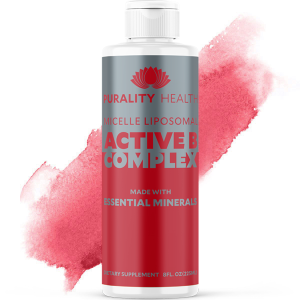 Do you know what the B complex is? Don’t worry, it’s not as complex as it sounds.
Do you know what the B complex is? Don’t worry, it’s not as complex as it sounds.
Ahem. Moving on…
The vitamin B complex is a group of 8 B vitamins which have a direct impact on your energy levels, brain function, cell metabolism, and more.
All 8 of the B vitamins are essential – meaning you need them for proper health – and they’re all water-soluble, so your body doesn’t store them. And, since your body doesn’t make them either, it’s crucial that you ensure you’re getting enough of these every day.
While the B complex supports your health in concert, all of them have their own unique and important functions throughout the body. While this is true for everyone, these vitamins play an important role in women’s health.
Below, we’ll cover each of the 8 B vitamins and how they support the health and well-being of women.
1. Vitamin B1 – thiamine
Thiamine helps the body convert carbohydrates into energy and plays a vital role in the metabolism of glucose. It also supports the healthy functioning of the nervous system, including the brain, by producing neurotransmitters that are involved in cognitive and memory processes.
Thiamine is also important in the production of DNA and RNA and helps to maintain healthy skin, hair, and nails.
Thiamine deficiency can lead to a condition called beriberi, which can affect the nervous system, cardiovascular system, and muscular system. Symptoms of beriberi include fatigue, weakness, confusion, and nerve damage. Severe thiamine deficiency can also lead to Wernicke-Korsakoff syndrome, which is a serious neurological disorder that can cause memory loss, confusion, and coordination problems.
There are a few reasons why thiamine may be particularly important for women:
- Pregnancy and breastfeeding: Women who are pregnant or breastfeeding require higher levels of thiamine to support the healthy growth and development of their baby. Thiamine is necessary for proper brain and nervous system development, so it is essential that pregnant and breastfeeding women get enough of this vitamin.
- Hormonal changes: Women go through hormonal changes throughout their lives, such as during puberty, menstruation, and menopause, which can impact the body’s nutrient needs. Thiamine can help support the nervous system during these times of hormonal changes and may help to reduce symptoms such as fatigue and irritability.
- Low-calorie diets: Some women may follow low-calorie diets for weight loss, which can put them at risk of thiamine deficiency. Thiamine is essential for energy production, so women who are following a low-calorie diet may not be getting enough of this vitamin to support their energy needs.
2. Vitamin B2 – riboflavin
 Riboflavin is involved in a variety of metabolic processes in the body, including energy production, cell growth, and the metabolism of fats, carbohydrates, and proteins. It also supports the healthy functioning of the nervous system and helps to maintain healthy skin, hair, and nails.
Riboflavin is involved in a variety of metabolic processes in the body, including energy production, cell growth, and the metabolism of fats, carbohydrates, and proteins. It also supports the healthy functioning of the nervous system and helps to maintain healthy skin, hair, and nails.
Riboflavin deficiency can lead to a condition called ariboflavinosis, which can cause symptoms such as cracks and sores on the lips and corners of the mouth, inflammation of the tongue, and red, itchy eyes. Riboflavin deficiency can also lead to anemia and an increased risk of certain types of cancer.
Here are some reasons why riboflavin is particularly important for women:
- Pregnancy and breastfeeding: Women who are pregnant or breastfeeding require higher levels of riboflavin to support the healthy growth and development of their baby. Riboflavin is necessary for proper fetal development and may help to reduce the risk of birth defects.
- Hormonal changes: Riboflavin may help to reduce symptoms associated with hormonal changes such as migraines.
- Oral contraceptive use: Some studies have suggested that oral contraceptive (ie. birth control) use may decrease riboflavin levels in the body. Therefore, women who use oral contraceptives may need to ensure they are getting enough riboflavin.
3. Vitamin B3 – niacin
Niacin plays many roles throughout the body, including turning food into energy, creating cholesterol and fats, creating and repairing DNA, and promoting healthy heart function.
A deficiency in niacin can lead to a condition called pellagra, which can cause symptoms such as skin rashes, digestive problems, and mental confusion. Severe niacin deficiency can also lead to a condition called niacin deficiency disease, which can cause inflammation of the skin, mouth, and digestive system.
Niacin is important for women specifically for the following reasons:
- Cardiovascular health: Niacin has been shown to improve cholesterol levels, which may reduce the risk of cardiovascular disease. Women are at increased risk of developing heart disease after menopause, so maintaining healthy cholesterol levels is important for their long-term health.
- Skin health: Niacin has been shown to have a beneficial effect on the skin, including reducing inflammation and improving the appearance of fine lines and wrinkles. This may be particularly important for women who are concerned about skin aging.
- Pregnancy: Women who are pregnant or planning to become pregnant require higher levels of niacin to support the healthy growth and development of their baby. Niacin is necessary for proper fetal development and may help to reduce the risk of birth defects.
4. Vitamin B5 – pantothenic acid
 Pantothenic acid is involved in the synthesis of coenzyme A (CoA), which is a molecule that is required for the metabolism of fats, carbohydrates, and proteins. CoA is also involved in the production of energy within cells, as well as the synthesis of certain hormones and neurotransmitters.
Pantothenic acid is involved in the synthesis of coenzyme A (CoA), which is a molecule that is required for the metabolism of fats, carbohydrates, and proteins. CoA is also involved in the production of energy within cells, as well as the synthesis of certain hormones and neurotransmitters.
Pantothenic acid is also important for maintaining healthy skin, hair, and nails. It has been shown to have a beneficial effect on acne and other skin conditions, and is often included in topical treatments for these conditions.
If you’re deficient in pantothenic acid you may be at a higher risk of a condition called pantothenate kinase-associated neurodegeneration (PKAN), which can cause symptoms such as progressive movement disorders and cognitive decline.
Here are some reasons it’s important for women to get optimal levels of pantothenic acid:
- Skin health: Pantothenic acid has been shown to have a beneficial effect on the skin, including reducing inflammation and improving the appearance of acne and other skin conditions. This may be important for women who are more prone to these types of skin conditions.
- Hormone production: Pantothenic acid is involved in the production of certain hormones, such as adrenal hormones, which play a crucial role in the body’s stress response. Women may be more susceptible to stress-related conditions, such as anxiety and depression, so ensuring adequate levels of pantothenic acid in the diet may be important for their overall health.
- Breast health: Pantothenic acid may also have a role in maintaining healthy breast tissue as research suggests that pantothenic acid may be helpful in preventing the development of breast cancer.
5. Vitamin B6 – pyridoxine
Pyridoxine is involved in the metabolism of proteins, fats, and carbohydrates, and plays a role in the production of red blood cells, neurotransmitters, and hormones. It is also important for immune function, as well as brain and nervous system development and function.
Research suggests that pyridoxine may have benefits for cardiovascular health, cognitive function, and mood regulation. It may also have a role in preventing or treating certain medical conditions, such as premenstrual syndrome (PMS), carpal tunnel syndrome, and nausea and vomiting during pregnancy.
A deficiency in pyridoxine may lead to skin inflammation, anemia, neurological symptoms, hormonal imbalances, and an increased risk of heart disease.
Here are some reasons pyridoxine is particularly important for women’s health:
- Hormone regulation: Pyridoxine is involved in the production of certain hormones, such as serotonin and melatonin, which can affect mood, sleep, and stress levels. Women may be more susceptible to imbalances in these hormones due to factors such as menstruation, pregnancy, and menopause. Adequate levels of pyridoxine in the diet may help to support hormone balance and overall mood and mental health.
- Pregnancy and breastfeeding: During pregnancy and breastfeeding, women have increased nutrient needs to support the growth and development of the fetus or infant. Pyridoxine is important for fetal brain and nervous system development, and may also help to prevent certain complications during pregnancy, such as morning sickness and gestational diabetes.
- Cardiovascular health: Women may have unique cardiovascular health concerns, such as a higher risk of heart disease after menopause. Pyridoxine helps support cardiovascular health by reducing inflammation, regulating blood pressure, and improving cholesterol levels.
- PMS: Pyridoxine may also be helpful for relieving symptoms of premenstrual syndrome (PMS), such as mood swings, bloating, and breast tenderness. It may help to support hormone balance during the menstrual cycle.
6. Vitamin B7 – biotin
 Biotin plays a key role in the metabolism of carbohydrates, proteins, and fats, and is involved in the production of energy. It’s also important for maintaining healthy skin, hair, and nails. This is because it supports the production of keratin, a protein that makes up their structure, and can help to prevent dryness, brittleness, and other problems associated with these tissues. It also supports the immune system, and has been linked to improved cognitive function and mood regulation.
Biotin plays a key role in the metabolism of carbohydrates, proteins, and fats, and is involved in the production of energy. It’s also important for maintaining healthy skin, hair, and nails. This is because it supports the production of keratin, a protein that makes up their structure, and can help to prevent dryness, brittleness, and other problems associated with these tissues. It also supports the immune system, and has been linked to improved cognitive function and mood regulation.
A biotin deficiency may lead to skin issues, hair loss, depression, cognitive impairment, muscle pain and weakness, and elevated blood sugar levels.
Here is why it’s important for women to get biotin:
- Promotes healthy hair and nails: Biotin is involved in the production of keratin, a protein that makes up hair, skin, and nails. Adequate biotin intake can help maintain healthy hair and nails and prevent dryness, brittleness, and breakage.
- Supports fetal development: During pregnancy, women have an increased need for many nutrients, including biotin. Biotin is involved in fetal development and growth, and low biotin levels during pregnancy may be linked to birth defects.
- Helps regulate blood sugar levels: Women with conditions such as polycystic ovary syndrome (PCOS) or gestational diabetes may be particularly interested in the blood sugar-regulating effects of biotin. Biotin is involved in glucose metabolism and may help improve insulin sensitivity and reduce blood sugar levels.
- Supports a healthy metabolism: Women who are trying to maintain a healthy weight or manage conditions such as thyroid disorders or metabolic syndrome may benefit from the metabolic effects of biotin. Biotin is involved in the metabolism of carbohydrates, fats, and protein, and helps convert food into energy that the body can use.
- May improve skin health: Studies suggest that biotin can help improve skin hydration and prevent acne, particularly in women with premenstrual syndrome (PMS).
7. Vitamin B9 – folate
Folate is especially important for the growth and development of cells and tissues, which are reproducing in your body at all times. Particularly, folate helps make red blood cells, which carry oxygen throughout the body.
Additionally, folate supports healthy brain function by producing neurotransmitters, it may reduce the risk of certain cancers, and it promotes a healthy heart.
A folate deficiency can lead to anemia, depression, cognitive decline, and put you at risk of a range of health issues in both the heart and brain.
Folate is especially important for women for a few key reasons:
- Fetal development: Folate is essential for proper fetal development during pregnancy. Women who are planning to become pregnant, as well as those who are pregnant, need to ensure they are getting enough folate to reduce the risk of neural tube defects, which can cause serious birth defects or even miscarriage.
- Menstrual cycle: Folate is important for the regular functioning of the menstrual cycle. A deficiency in folate can lead to irregular periods, and women who do not get enough folate may have a higher risk of infertility.
- Hormonal balance: Folate is also involved in the production of estrogen, progesterone, and other hormones. Adequate folate intake may help regulate hormone levels and reduce the risk of hormone-related conditions such as PCOS (polycystic ovary syndrome).
- Breastfeeding: Women who are breastfeeding may need extra folate to support the growth and development of their baby.
- Overall health: Like all essential vitamins, folate is important for overall health, and can help prevent a variety of health problems that women may be at higher risk for, including heart disease and certain types of cancer.
8. Vitamin B12 – cobalamin
Cobalamin plays a crucial role in the production of red blood cells, which carry oxygen throughout the body. Cobalamin also helps maintain a healthy nervous system, protects the myelin sheath that surrounds nerve fibers, and is involved in the synthesis of neurotransmitters that transmit signals in the brain.
Additionally, cobalamin is essential for DNA synthesis and may help maintain cognitive health as we age. It’s particularly important for vegans, vegetarians, and older adults, who may all be at higher risk of deficiency.
A deficiency in cobalamin (vitamin B12) can have a range of negative health effects. These include anemia, damage to the nervous system, cognitive decline, and an increased risk of heart disease.
- Pregnancy and breastfeeding: Cobalamin can help prevent complications during pregnancy, including neural tube defects and low birth weight. It also helps support any loss of blood during pregnancy and ensures breast milk contains enough B12 for the baby’s needs.
- Reduces risk of anemia: Women are at a higher risk of developing anemia due to menstrual blood loss and pregnancy-related blood volume expansion. Cobalamin helps maintain healthy blood levels which is crucial for overall health, as well as preventing anemia.
- Supports healthy cognition: Women are more likely to get dementia, outnumbering men 2:1. As such, it’s crucial for women to maintain the health of their brain as they age. Research shows that vitamin B12 can help maintain cognitive help and reduce the risk of dementia.
 The importance of B complex
The importance of B complex
When you break it down, you just read 29 reasons why a B complex supplement can help support women’s health.
Whether you’re a woman, or you have women in your life whose health you want to look out for, it’s important to ensure that the requirements for all eight of the above nutrients are being met.
Purality Health’s Micelle Liposomal Active B Complex can help you do just that.
Our formula contains ALL eight B vitamins, each of them in a highly absorbable form so that you can be confident they’re getting fully absorbed and used by your body.
Purality Health’s Active B Complex also contains NINE other crucial nutrients for added support.
